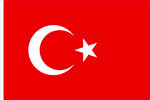
Population
85M+
CHRISTIAN PERSECUTION STATUS
high
Persecution
CHRISTIAN POPULATION
<1%
Status of
the church
Türkiye (formerly Turkey) currently has an estimated population of 85 million, of which 99.5% are Muslim and 0.2% Christian; the Christian population is approximately 169,000. The country has 200 registered churches today (Middle East Concern). The Armenian and Syrian churches make up the majority of congregations. Proselytizing is legal in Türkiye but is viewed as socially unacceptable and dangerous, and there have been reports of vandalism of churches and attacks on new believers. Religion is noted on state-issued identity cards, which can foster increased persecution against Christians.
Christians face restrictions on owning property, training leaders, and obtaining visas for foreign workers. In 2015, the government granted permission for a new church building, the first in 90 years. Christians also endure societal opposition, threats, vandalism of church buildings, and discrimination in employment.
Türkiye is a multicultural, multi-ethnic country that has seen much civil and political unrest amongst ethnic minorities. The Kurds of south-eastern Türkiye have campaigned for several years for greater autonomy and political representation. The conflict in neighboring Syria has worsened sectarian divisions.
SAT-7 TÜRK, which began broadcasting in 2015, is the first and only Christian channel allowed to broadcast on the government-regulated satellite Türksat. SAT-7 TÜRK is available to over 50 million people on satellite television and anyone with Internet access (over 70% of the population) (CIA World Factbook).
Location
Prayer points
What our viewers are saying